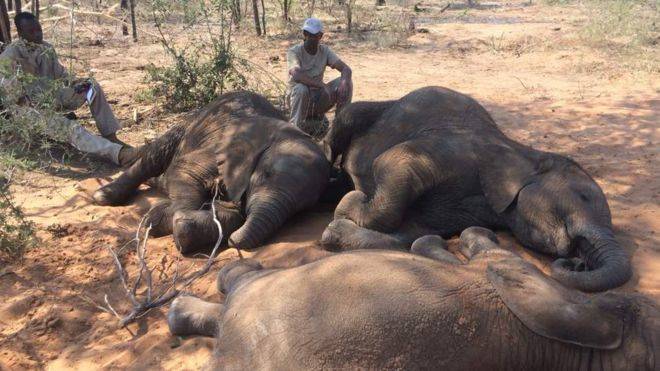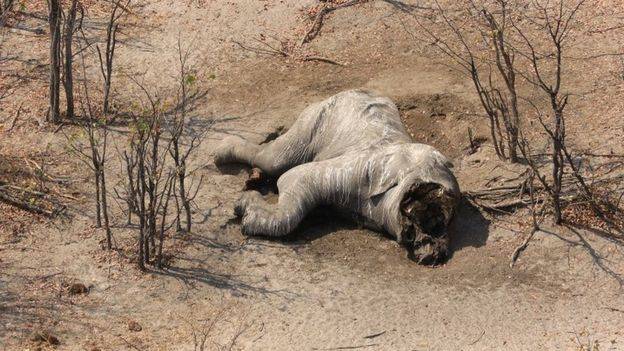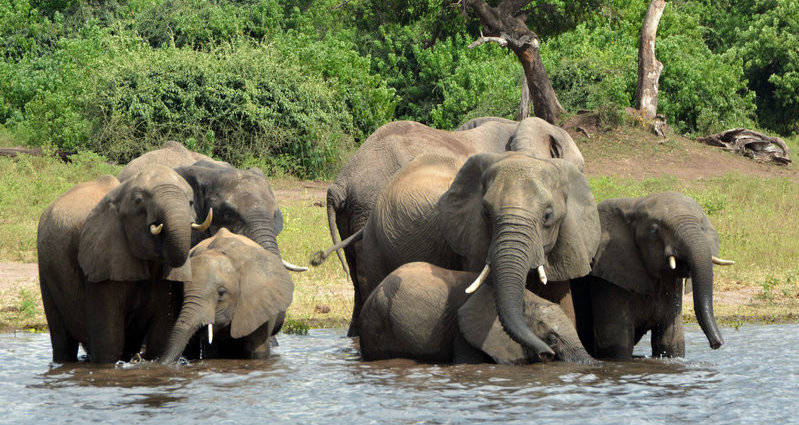The discovery of the elephant carcasses comes just a few months after the country's strict anti-poaching policy was changed.

Elephants Without BordersSome of the poached elephants in Botswana.
Botswana is facing a new poaching threat after 87 of their elephants were found dead just outside of a wildlife sanctuary.
Elephants Without Borders, a conservation nonprofit, made the grisly discovery while conducting an aerial survey of the wildlife in the area.
Dr. Mike Chase, the director and founder of the organization, told the BBC that this amount of deaths by poachers is “by far the largest I’ve seen or read about anywhere in Africa to date.”
“When I compare this to figures and data from the Great Elephants Census, which I conducted in 2015, we are recording double the number of fresh poached elephants than anywhere else in Africa,” Chase added.
According to the BBC, Botswana has around 130,000 elephants, which is the largest elephant population in the world. Elsewhere, elephants are targeted in earnest for their ivory tusks, a practice which has caused elephant populations around the continent to plummet.
Until recently, Botswana mostly appeared to be a safe haven for the animals, but the country’s elephants have come under threat after the anti-poaching unit was disarmed in May, just one month after a new president took office. According to a spokesperson for the new president, the “government has decided to withdraw military weapons and equipment from the Department of Wildlife and National Parks.” No further explanation was provided.
“People did warn us of an impending poaching problem and we thought we were prepared for it,” Chase told the BBC. “The poachers are now turning their guns to Botswana. We have the world’s largest elephant population and it’s open season for poachers.”

Elephants Without BordersA dead elephant with its tusks removed.
NPR reports that the country previously had a shoot-to-kill policy in place for combatting poachers. The Botswana Defense Force (BDF), an anti-poaching unit, was allowed to shoot suspected poachers.
According to CNN, the hunt for ivory was previously contained to just Botswana’s international borders, but this new discovery of dozens of poached elephants deep inside the country shows that things are changing.
Large-scale poaching incidents such as this one were rare before the policy for anti-poaching was changed. Chase told the BBC that something needs to be done to protect the elephants now that the shoot-to-kill policy is no longer in place.
“Clearly we need to be doing more to stop the scale of what were are recording on our survey,” Chase said.

Charmaine Noronha/APElephants in the Chobe National Park in Botswana.
The 87 elephant carcasses were discovered near the Okavango Delta wildlife sanctuary deep in Botswana, according to NPR. The wildlife sanctuary is a huge tourist destination and the tourism is crucial for the country’s economy.
Chase told the BBC that Botswana’s government needs to act quickly in order to save the animals who make up such an integral part of the country.
“Botswana has always been at the forefront of conservation and it will require political will,” he said. “Our new president must uphold Botswana’s legacy and tackle this problem quickly. Tourism is vitally important for our economy, jobs, as well as our international reputation, which is at stake here as being a safe stronghold for elephants.”
The decision to disarm Botswana’s anti-poaching units has greatly impacted the country. After less than four months, the elephant population has taken one record-breaking hit and if no new policy is put in place, it could be just the beginning.
Next, discover why poaching has caused some African elephants to be born without tusks. Then read the sad story of nine elephants who were accidentally electrocuted in Botswana.





